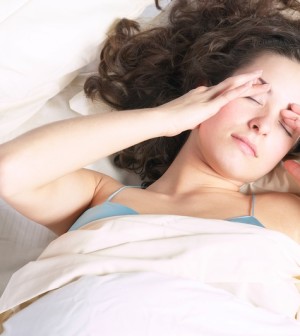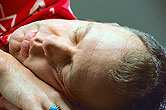- Could Your Grocery Store Meat Be Causing Recurring UTIs?
- Are You Making This Expensive Thermostat Error This Winter?
- Recognizing the Signs of Hypothyroidism
- 10 Strategies to Overcome Insomnia
- Could Artificial Sweeteners Be Aging the Brain Faster?
- Techniques for Soothing Your Nervous System
- Does the Water in Your House Smell Funny? Here’s Why
- Can a Daily Dose of Apple Cider Vinegar Actually Aid Weight Loss?
- 6 Health Beverages That Can Actually Spike Your Blood Sugar
- Treatment Options for Social Anxiety Disorder
Sleep Apnea May Lower Your Aerobic Fitness


People with sleep apnea may have lower levels of aerobic fitness, a new study suggests.
Sleep apnea causes the upper airway to become blocked by soft tissue in the back of the throat during sleep. This causes pauses in breathing and other symptoms, such as gasping and snoring.
The research included 15 adults with moderate to severe obstructive sleep apnea and a comparison group of 19 adults with mild or no apnea. They pedaled a stationary bike at increasingly harder resistance levels — similar to climbing up a progressively steeper hill — and kept going until exhaustion.
On average, people in the sleep apnea group scored 14 percent lower on a test that measures the maximum amount of oxygen a person can take in during intense exercise. This measurement is called VO2 max.
People with sleep apnea are more likely to be overweight or obese, and thus less fit, the researchers noted. However, they found that people with sleep apnea had poorer aerobic fitness than those in the comparison group, even if they were the same body size.
Although this study found an association between lower oxygen intake during activity and sleep apnea, it wasn’t designed to prove that sleep apnea was the definitive cause of this difference.
Results of the study were published in the Nov. 15 issue of the Journal of Clinical Sleep Medicine.
“Encouraging patients to exercise more is part of the story, but that is not the whole story,” lead author Dr. Jeremy Beitler, assistant clinical professor in pulmonary and critical care medicine at the University of California, San Diego School of Medicine, said in a university news release.
“We believe the sleep apnea itself causes structural changes in muscle that contributes to their difficulty exercising,” he added.
The researchers said measuring VO2 max may help identify sleep apnea patients at increased risk for heart attack and stroke, which could encourage earlier treatment of sleep apnea, which is underdiagnosed and often untreated.
More information
The American Academy of Family Physicians has more about sleep apnea.
Source: HealthDay
Copyright © 2026 HealthDay. All rights reserved.










